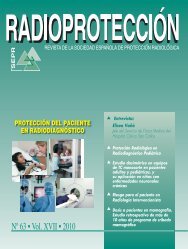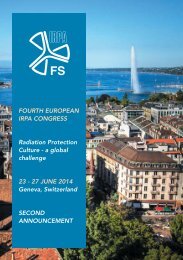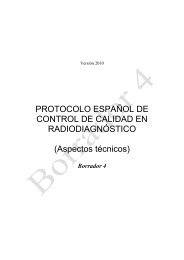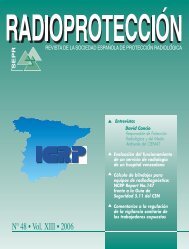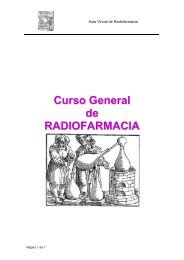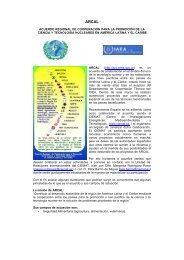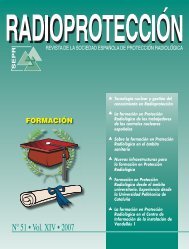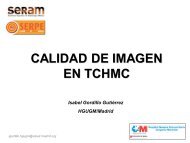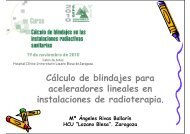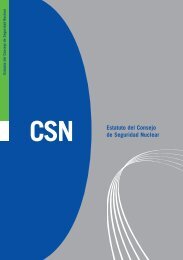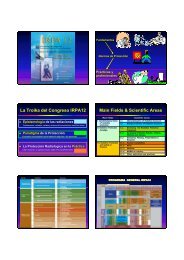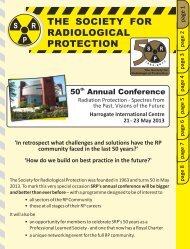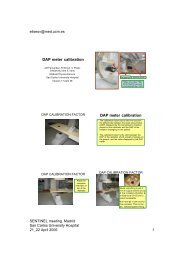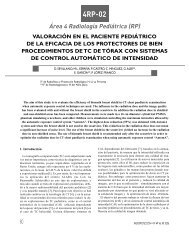Download the IRPA 2014 3rd Announcement
Download the IRPA 2014 3rd Announcement
Download the IRPA 2014 3rd Announcement
You also want an ePaper? Increase the reach of your titles
YUMPU automatically turns print PDFs into web optimized ePapers that Google loves.
Scientific Programme - Call for abstracts<br />
Abstracts for oral and poster presentations should be submitted by 15 September 2013. The authors<br />
will receive notification of acceptance by 15 December 2013. For <strong>the</strong> accepted contributions<br />
extended abstracts can be provided by <strong>the</strong> authors up to 15 March <strong>2014</strong>. Only presentations of<br />
registered participants with paid registration fee will be included in <strong>the</strong> programme. The final<br />
programme will be available on <strong>the</strong> Congress website on 15 May <strong>2014</strong>. Congress material will<br />
include <strong>the</strong> programme booklet and a memory stick containing <strong>the</strong> programme and <strong>the</strong> book of<br />
abstracts and extended abstracts. Poster presentations will be available throughout <strong>the</strong> Congress.<br />
Submission of abstracts, extended abstracts and posters takes place electronically via European<br />
<strong>IRPA</strong> website www.irpa<strong>2014</strong>europe.com. Please indicate <strong>the</strong> topical area for your presentation<br />
and <strong>the</strong> presenting author. Fur<strong>the</strong>r instructions for preparation of abstracts, extended abstracts,<br />
and posters will be given on <strong>the</strong> website.<br />
Congress objectives<br />
• to understand and to promote<br />
radiation protection culture in<br />
all applications and its relation to<br />
general safety culture,<br />
• to discuss open questions and<br />
common challenges and to<br />
outline perspectives,<br />
• to streng<strong>the</strong>n <strong>the</strong> cooperation<br />
between professional societies,<br />
international organizations,<br />
regulators, NGOs, and key players<br />
in society,<br />
• to develop tools for improving<br />
communication between experts,<br />
regulators, professionals, patients,<br />
and members of <strong>the</strong> public.<br />
Congress topics<br />
1 Biological and health effects of ionizing and<br />
non-ionizing radiation<br />
2 Radiation measurement and dosimetry<br />
3 Fundamentals of radiation protection of<br />
ionizing and non-ionizing radiation<br />
4 Regulation of <strong>the</strong> different exposure situations<br />
5 Environmental radioactivity and radioecology<br />
6 Radiation protection of patients, medical staff,<br />
and comforters<br />
7 Radiation protection of workers in nuclear,<br />
NORM, and o<strong>the</strong>r industries, and research<br />
8 Radiation protection of <strong>the</strong> public<br />
9 Protection of <strong>the</strong> environment<br />
J Nuclear safety and security<br />
K Emergencies: Lessons learnt, preparedness and<br />
response<br />
L Education in and fostering of radiation protection<br />
M Interaction with society<br />
Programme outline and provisional schedule<br />
The broad range of Congress topics will encourage discussions of all aspects of radiation<br />
protection culture covering ionising as well as non-ionising radiation. Seven plenary sessions will<br />
be dedicated to key aspects of <strong>the</strong> Congress objectives and a total of twenty-seven sessions will be<br />
arranged around <strong>the</strong> plenaries with three sessions in parallel. Oral presentations for <strong>the</strong> plenaries<br />
will be invited or carefully selected from <strong>the</strong> submitted contributions. Each parallel session will<br />
be introduced by an invited speaker followed by submitted oral presentations. Posters represent<br />
an important part of <strong>the</strong> scientific programme and <strong>the</strong>refore ample time for poster viewing and<br />
discussions among <strong>the</strong> participants and with <strong>the</strong> authors is foreseen.<br />
The interdisciplinarity of radiation protection culture cover <strong>the</strong> scientific and ethical basis, value<br />
judgement, regulations, practical implementation and <strong>the</strong> interaction with society.<br />
The programme will address recent findings and on-going research on radiation biology,<br />
tissue reactions, stochastic effects (both cancer and non-cancer diseases), <strong>the</strong> quantification of<br />
occupational, public, and medical radiation exposures including both ionizing and non-ionizing<br />
radiation, natural and technologically enhanced radioactivity and man-made radionuclides in <strong>the</strong><br />
environment, as well as all aspects of radioactive waste disposal.<br />
Given <strong>the</strong> detrimental effects of ionizing radiation, <strong>the</strong> use of radiation and radioactivity to <strong>the</strong><br />
benefit of society requires an ethical basis of radiation protection, value judgement and regulations<br />
covering <strong>the</strong> scheme of planned, existing, and emergency exposure situations as set outby <strong>the</strong><br />
ICRP in its publication 103.<br />
In all exposure situations, successful radiation protection requires <strong>the</strong> practical implementation<br />
of its principles and regulations. Special emphasis will be given to radiation protection in <strong>the</strong><br />
medical field. Practical implementation also includes <strong>the</strong> education of <strong>the</strong> next generation of<br />
professionals and a world-wide harmonization of radiation protection.<br />
Interaction and communication with society as well as fostering radiation protection will be a<br />
focus of <strong>the</strong> programme.<br />
Young scientist and professional award<br />
Ensuring competence in <strong>the</strong> field of radiation safety requires <strong>the</strong> education and encouragement<br />
of qualified professionals and trainees. The promotion of young scientists and professionals is<br />
<strong>the</strong>refore of high importance for <strong>the</strong> European <strong>IRPA</strong> societies. To this end <strong>the</strong> societies participating<br />
in <strong>the</strong> organisation of <strong>the</strong> Congress offer an award for <strong>the</strong> best scientific or professional<br />
contribution(s).<br />
National societies will be responsible for <strong>the</strong> nomination of <strong>the</strong>ir candidate; <strong>the</strong>y are expected<br />
to support <strong>the</strong> participation of <strong>the</strong> candidate in <strong>the</strong> Congress. The nomination of candidates<br />
must be submitted to <strong>the</strong> <strong>IRPA</strong> <strong>2014</strong> Young Scientist and Professional Award Committee before<br />
October 1, 2013. The nomination must be accompanied by an abstract, a CV and an explanatory<br />
statement from <strong>the</strong> nominating society. The presentation will be integrated into <strong>the</strong> scientific<br />
programme with an oral presentation of <strong>the</strong>ir paper at <strong>the</strong> Congress. The Young Scientist and<br />
Professional Award Committee will elect <strong>the</strong> award winning contribution. The Young Scientist<br />
and Professional Award Committee is free to award more than one contribution. The award will<br />
carry remuneration. For inquiries and nominations contact <strong>the</strong> chairman of Young Scientist and<br />
Professional Award Committee, Alfred Hefner, via e-mail: alfred.hefner@seibersdorf–laboratories.at<br />
or alfred.hefner@ait.ac.at.<br />
6 7



